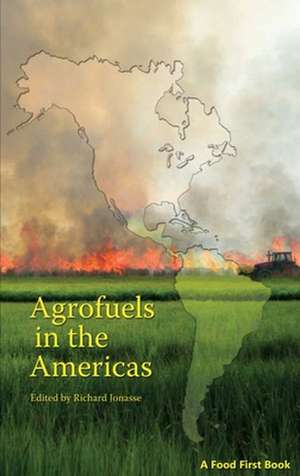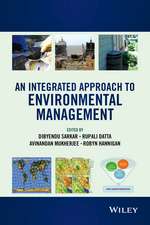Agrofuels in the Americas
Editat de Richard Jonasseen Limba Engleză Paperback – 31 aug 2009
Agrofuels in the Americas
Behind the hype and misinformation surrounding agrofuels lie the wrenching realities of hunger and poverty, the loss of land for food production, destructive agricultural practices, the advancement of genetically modified crops and synthetic organisms; and land use changes that lead to a loss of irreplaceable biomes, contribute to global warming, and diminish planetary biodiversity.
Industrialized countries, unable to meet their renewable fuel mandates, have turned to the agricultural resources of the Global South to fill their energy needs. In Latin America, Northern corporations and Southern elites have locked up vast tracts of land for industrial monocrop agrofuels: cutting down rainforests, plowing up diverse native savannahs, and destroying the future fertility of the land with short-sighted agricultural practices.
Agrofuels provide agricultural corporations with an opportunity to squeeze more profit out of both food and fuel. Financial institutions looking for solid ground in a stagnating economy have jumped into the fray, pouring billions of investment dollars and Euros into agrofuel investments, fanning the flames, and causing further dislocation and destruction. International Financial Institutions are backing agrofuels as a trickle-down tool for ‘rural development.’
In Latin America, the rural poor and indigenous populations are losing their access to land; leading to poverty, dislocation and the inability to grow their own food. Their only recourse often lies in chasing the relatively few tenuous, seasonal jobs that the agrofuels industry provides. The agrofuels trade thus places poor laborers at the bottom of an export-oriented value chain from which they cannot escape. It has led to food shortages and increased hunger.
For those familiar with the history of Latin America this is a very old story cloaked in new “green” clothing. Behind the myth perpetuated by corporations—that we can save the planet through activities that spin off tremendous environmental and social externalities—lies an ongoing consolidation of corporate power over our food and fuel systems.
Behind the hype and misinformation surrounding agrofuels lie the wrenching realities of hunger and poverty, the loss of land for food production, destructive agricultural practices, the advancement of genetically modified crops and synthetic organisms; and land use changes that lead to a loss of irreplaceable biomes, contribute to global warming, and diminish planetary biodiversity.
Industrialized countries, unable to meet their renewable fuel mandates, have turned to the agricultural resources of the Global South to fill their energy needs. In Latin America, Northern corporations and Southern elites have locked up vast tracts of land for industrial monocrop agrofuels: cutting down rainforests, plowing up diverse native savannahs, and destroying the future fertility of the land with short-sighted agricultural practices.
Agrofuels provide agricultural corporations with an opportunity to squeeze more profit out of both food and fuel. Financial institutions looking for solid ground in a stagnating economy have jumped into the fray, pouring billions of investment dollars and Euros into agrofuel investments, fanning the flames, and causing further dislocation and destruction. International Financial Institutions are backing agrofuels as a trickle-down tool for ‘rural development.’
In Latin America, the rural poor and indigenous populations are losing their access to land; leading to poverty, dislocation and the inability to grow their own food. Their only recourse often lies in chasing the relatively few tenuous, seasonal jobs that the agrofuels industry provides. The agrofuels trade thus places poor laborers at the bottom of an export-oriented value chain from which they cannot escape. It has led to food shortages and increased hunger.
For those familiar with the history of Latin America this is a very old story cloaked in new “green” clothing. Behind the myth perpetuated by corporations—that we can save the planet through activities that spin off tremendous environmental and social externalities—lies an ongoing consolidation of corporate power over our food and fuel systems.
Preț: 103.29 lei
Nou
Puncte Express: 155
Preț estimativ în valută:
19.76€ • 20.64$ • 16.32£
19.76€ • 20.64$ • 16.32£
Carte tipărită la comandă
Livrare economică 15-29 aprilie
Preluare comenzi: 021 569.72.76
Specificații
ISBN-13: 9780935028362
ISBN-10: 0935028366
Pagini: 185
Dimensiuni: 152 x 226 x 15 mm
Greutate: 0.3 kg
Editura: Food First Books
ISBN-10: 0935028366
Pagini: 185
Dimensiuni: 152 x 226 x 15 mm
Greutate: 0.3 kg
Editura: Food First Books
Notă biografică
Eric Holt-Giménez assumed the position of executive director of FoodFirst/Institute for Food and Development Policy on July 17, 2006. Eric is the author of the latest Food First Book, Campesino a Campesino: Voices from Latin America’s Farmer to Farmer Movement for Sustainable Agriculture and which chronicles the development of this movement in Mexico and Central America over two and a half decades. He is Co-Author, With Raj Patel with Annie Shattuck, of the recent Food Rebellions: Crisis and the Hunger for Justice: The real story behind the world food crisis and what we can do about it.
Annie Shattuck is a policy analyst at the Institute for Food and Development Policy. Annie has written and spoken extensively on the global food crisis, agrofuels, climate change and food sovereignty. Trained in biology and agroecology, she has worked in participatory action research, rural development, and ecology research in the U.S. and Latin America. She is co-author of the book Food Rebellions!
Richard Jonasse is currently a Research Fellow at Food First in Oakland, CA. His research interests lie in development issues, including International Finance Institutions, food sovereignty, labor/human rights, and environmental sustainability. He has Ph.D. in Communication (Science and Technology) from U. C. San Diego.
Gretchen Gordon is a writer and consultant on Latin America, energy, and globalization. She has worked in economic justice advocacy in the U.S. and Latin America, and formerly directed the Washington, D.C. based Citizens Trade Campaign. She has an MA in Latin American Studies from the University of California at Berkeley and is a fellow at Food First/Institute for Food and Development Policy, based in Oakland, CA.
Jessica Aguirre is a freelance writer and a farmer. She holds a degree in Economics from Smith College.
Laura Hurtado is a researcher and writer for ActionAid in Guatemala.
Maria Luisa Mendonça is a journalist and coordinates the Network on Social Justice and Human Rights in Brazil.
Miguel Altieri has been a Professor of Agroecology at UC Berkeley since 1981 in the Department of Environmental Science, Policy and Management. He served for 4 years as the General Coordinator for the United Nations Development Programme's Sustainable Agriculture Networking and Extension Programme which aimed at capacity building on agroecology among NGOs and the scaling-up of successful local sustainable agricultural initiatives in Africa, Latin America and Asia. He continues to write and advocate for agroecological methods and food sovereignty throughout Latin America.
Brian Tokar is a long-time activist and author, and the current director of the Institute for Social Ecology, based in Plainfield, Vermont, USA. He is the author of The Green Alternative, and Earth for Sale, edited two books on the politics of biotechnology, Redesigning Life? and Gene Traders, and co-edited the forthcoming collection, Agriculture and Food in Crisis: Conflict, Resistance and Renewal (Monthly Review Press).
Rachel Smolker is an independent research scientist, based in Hinesburg, Vermont, and Brian Tokar is the director of the Institute for Social Ecology, based in Plainfield, Vermont. For more information on the Institute, go to social-ecology.org.
Annie Shattuck is a policy analyst at the Institute for Food and Development Policy. Annie has written and spoken extensively on the global food crisis, agrofuels, climate change and food sovereignty. Trained in biology and agroecology, she has worked in participatory action research, rural development, and ecology research in the U.S. and Latin America. She is co-author of the book Food Rebellions!
Richard Jonasse is currently a Research Fellow at Food First in Oakland, CA. His research interests lie in development issues, including International Finance Institutions, food sovereignty, labor/human rights, and environmental sustainability. He has Ph.D. in Communication (Science and Technology) from U. C. San Diego.
Gretchen Gordon is a writer and consultant on Latin America, energy, and globalization. She has worked in economic justice advocacy in the U.S. and Latin America, and formerly directed the Washington, D.C. based Citizens Trade Campaign. She has an MA in Latin American Studies from the University of California at Berkeley and is a fellow at Food First/Institute for Food and Development Policy, based in Oakland, CA.
Jessica Aguirre is a freelance writer and a farmer. She holds a degree in Economics from Smith College.
Laura Hurtado is a researcher and writer for ActionAid in Guatemala.
Maria Luisa Mendonça is a journalist and coordinates the Network on Social Justice and Human Rights in Brazil.
Miguel Altieri has been a Professor of Agroecology at UC Berkeley since 1981 in the Department of Environmental Science, Policy and Management. He served for 4 years as the General Coordinator for the United Nations Development Programme's Sustainable Agriculture Networking and Extension Programme which aimed at capacity building on agroecology among NGOs and the scaling-up of successful local sustainable agricultural initiatives in Africa, Latin America and Asia. He continues to write and advocate for agroecological methods and food sovereignty throughout Latin America.
Brian Tokar is a long-time activist and author, and the current director of the Institute for Social Ecology, based in Plainfield, Vermont, USA. He is the author of The Green Alternative, and Earth for Sale, edited two books on the politics of biotechnology, Redesigning Life? and Gene Traders, and co-edited the forthcoming collection, Agriculture and Food in Crisis: Conflict, Resistance and Renewal (Monthly Review Press).
Rachel Smolker is an independent research scientist, based in Hinesburg, Vermont, and Brian Tokar is the director of the Institute for Social Ecology, based in Plainfield, Vermont. For more information on the Institute, go to social-ecology.org.






